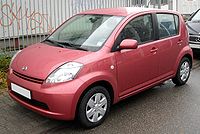Daihatsu Sirion: Difference between revisions
Alex Neman (talk | contribs) Sirion |
m clarification of years for M100 and M101 |
||
| (48 intermediate revisions by 30 users not shown) | |||
| Line 1: | Line 1: | ||
{{refimprove|date=January 2022}} |
|||
The {{nihongo|'''Daihatsu Sirion'''|Japanese: ダイハツ・シリオン|Daihatsu Shirion}} is a [[subcompact car]] produced by the Japanese automobile manufacturer [[Daihatsu]] since 1998. The "Sirion" name has been used on export versions of the Japanese market [[Daihatsu Storia|Storia]] (1998–2004) and [[Daihatsu Boon|Boon]] (2004–2010). From 2011 to 2018, the name has been used in Indonesia for the second generation of the Malaysian-built [[Perodua Myvi]] (2011–2017), in turn a redesigned version of the second generation Boon (2010–2016). Since 2018, the name has been used in Indonesia once again for the third generation of the Malaysian-built Myvi (2017–present). |
|||
{{use dmy dates|date=July 2022}} |
|||
{{Infobox automobile |
|||
| name = Daihatsu Sirion |
|||
| ⚫ | |||
| manufacturer = {{unbulleted list |
|||
| [[Daihatsu]] (1998–2015) |
|||
| [[Perodua]] (2007–present) |
|||
}} |
|||
| aka = {{unbulleted list |
|||
| [[Daihatsu Storia]] (1998–2004) |
|||
| [[Daihatsu Boon]] (2004–2015) |
|||
| Toyota Duet (1998–2004) |
|||
| Toyota Passo (2004–2015) |
|||
| [[Subaru Justy]] (2007–2011) |
|||
| [[Perodua Myvi]] (2007–present) |
|||
}} |
|||
| production = June 1998 – present |
|||
| class = [[Subcompact car]]/[[Supermini]] |
|||
| body_style = 5-door [[hatchback]] |
|||
| layout = {{unbulleted list |
|||
| [[Front-engine, front-wheel-drive]] |
|||
| [[Front-engine, four-wheel-drive]] (1998–2013) |
|||
}} |
|||
| predecessor = [[Daihatsu Charade]] |
|||
| sp = uk |
|||
}} |
|||
The '''Daihatsu Sirion''' is a [[subcompact]]/[[supermini]] [[hatchback]] produced by the Japanese automobile manufacturer [[Daihatsu]] since 1998. The Sirion nameplate was first used on export versions of the Japanese market [[Daihatsu Storia|Storia]] (between 1998 and 2004) and [[Daihatsu Boon|Boon]] (between 2004 and 2015). There are 2 models of the 1998 -2004 Sirion. The M100 (3cylinder 998cc) and the M101 a 4 cylinder 1.3L model. Both M100 and M101 were available in manual or automatic transmissions. Since 2007, the nameplate has also been used in Indonesia for the Malaysian-built [[Perodua Myvi]], which in its first two generations were redesigned versions of the first and second-generation Boon, while the third generation is a fully independent model developed in-house by Perodua with technical supports from Daihatsu.<ref>{{cite news |last=Tan |first=Danny |date=2017-11-16 |title=DRIVEN: New 2018 Perodua Myvi – first impressions |url=https://paultan.org/2017/11/16/driven-new-2018-perodua-myvi-first-impressions-review/ |website=[[Paultan.org|Paul Tan]] |publisher=Driven Communications |location=Malaysia |access-date=2022-01-28}}</ref> |
|||
| ⚫ | |||
;International |
|||
| ⚫ | |||
File:1998-2001 Daihatsu Sirion (M100) hatchback (2011-06-15).jpg|First generation (M100): 1998–2004 {{main|Daihatsu Storia}} |
File:1998-2001 Daihatsu Sirion (M100) hatchback (2011-06-15).jpg|First generation (M100): 1998–2004 {{main|Daihatsu Storia}} |
||
File:Daihatsu Sirion |
File:Daihatsu Sirion front 20081202.jpg|Second generation (M300): 2004–2015 {{main|Daihatsu Boon#M300|l1=Daihatsu Boon (M300)}} |
||
| ⚫ | |||
File:2008 Daihatsu Sirion (Perodua Myvi), West Surabaya.jpg|Second generation (M300; facelift, Indonesia): 2008–2011 |
|||
| ⚫ | |||
| ⚫ | |||
| ⚫ | |||
</gallery> |
</gallery> |
||
;Indonesia |
|||
<gallery widths="200" heights="133"> |
|||
| ⚫ | |||
| ⚫ | |||
| ⚫ | |||
</gallery> |
|||
| ⚫ | |||
== References == |
|||
{{reflist}} |
|||
== External links == |
|||
{{Commons category}} |
{{Commons category}} |
||
* {{Official website|https://daihatsu.co.id/product/new-sirion/}} (Indonesia) |
|||
{{Daihatsu}} |
{{Daihatsu}} |
||
{{Daihatsu timeline}} |
{{Daihatsu timeline}} |
||
{{Daihatsu timeline, 2020–present}} |
|||
| ⚫ | |||
[[Category:Daihatsu vehicles|Sirion]] |
[[Category:Daihatsu vehicles|Sirion]] |
||
[[Category:Cars introduced in 1998]]<!-- <nowiki>[[Category:1990s cars]]</nowiki> is not needed because already included in [[Category:Cars introduced in 1998]]. See [[WP:SUBCAT]] --> |
|||
[[Category:2000s cars]] |
|||
[[Category:2010s cars]] |
|||
[[Category:2020s cars]] |
|||
[[Category:Subcompact cars]] |
[[Category:Subcompact cars]] |
||
[[Category: |
[[Category:Hatchbacks]] |
||
[[Category:Front-wheel-drive vehicles]] |
|||
[[Category:All-wheel-drive vehicles]] |
|||
[[Category:Vehicles with CVT transmission]] |
|||
Latest revision as of 03:55, 30 July 2024
This article needs additional citations for verification. (January 2022) |
| Daihatsu Sirion | |
|---|---|
 | |
| Overview | |
| Manufacturer | |
| Also called |
|
| Production | June 1998 – present |
| Body and chassis | |
| Class | Subcompact car/Supermini |
| Body style | 5-door hatchback |
| Layout | |
| Chronology | |
| Predecessor | Daihatsu Charade |
The Daihatsu Sirion is a subcompact/supermini hatchback produced by the Japanese automobile manufacturer Daihatsu since 1998. The Sirion nameplate was first used on export versions of the Japanese market Storia (between 1998 and 2004) and Boon (between 2004 and 2015). There are 2 models of the 1998 -2004 Sirion. The M100 (3cylinder 998cc) and the M101 a 4 cylinder 1.3L model. Both M100 and M101 were available in manual or automatic transmissions. Since 2007, the nameplate has also been used in Indonesia for the Malaysian-built Perodua Myvi, which in its first two generations were redesigned versions of the first and second-generation Boon, while the third generation is a fully independent model developed in-house by Perodua with technical supports from Daihatsu.[1]
- International
-
First generation (M100): 1998–2004
-
Second generation (M300): 2004–2015
- Indonesia
-
First generation (M300): 2007–2011
-
Second generation (M600): 2011–2018
-
Third generation (M800): 2018–present
References
[edit]- ^ Tan, Danny (16 November 2017). "DRIVEN: New 2018 Perodua Myvi – first impressions". Paul Tan. Malaysia: Driven Communications. Retrieved 28 January 2022.
External links
[edit]- Official website (Indonesia)





